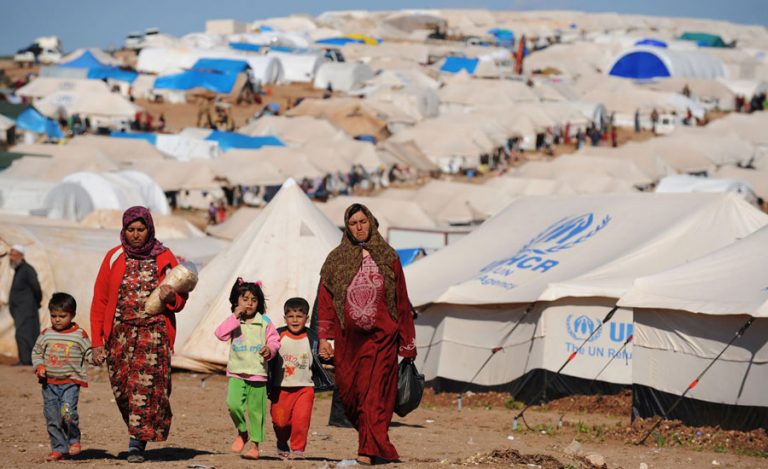As is her custom, every morning the widow Umm Ali, 57, goes out to work in one of the fields in the northern countryside of the city of Azaz to provide her grandchildren with enough to eat. Their fathers, Mustafa and Ali, were killed a month apart leaving her to care for 11 grandchildren, the oldest of whom is no more than 13 years.
With a friendly Bedouin dialect and in front of her tent in the Shaman area, Umm Ali receives her guests with a cup of tea, paying no regard to the boils which cover her hands and feet.
She pursues her work as “there is no one here to do this for me,” she says. Raising her eyes to the sky, she implores God to maintain her health to be able to finish the task, and explains that the boils came from “oppression and not from labor.”
Umm Ali has paid a double price after she lost her husband and her sons, and has now become responsible for caring for a large family, carrying the men’s burden. She has since found herself in the Al-Rayyan camp after moving between many villages. She points to the caravan which protects her from the cold of winter and the heat of summer, as she puts it, and although she is full of pride, tears cover her face as she complains of her hard circumstances.
“We have no sponsorship or aid,” she says, explaining that she waited for help for two years after NGOs recorded her details, to no avail. So she was forced to work in the fields for five hours a day for 1,250 Syrian pounds (about $2.50), which is not enough for the price of bread given the heavy inflation which the area has witnessed.
Humanitarian groups have distributed some foodstuffs and cleaning supplies. But the residents in Al-Rayyan, ever since Mercy Corps stopped working in the camp five months ago, have not seen any aid.
Nasser Hussein, a Mercy Corps worker, said: “The group stopped its work in the northern countryside of Aleppo five months ago because of administrative reasons related to the group’s license being canceled in Turkey. There is talk that the group’s license will be returned with a new name, as the only route to deliver food is from Turkey.”
He says that the group is considering alternative solutions like distributing financial vouchers instead of food baskets and cleaning material, and liaising with shops to distribute these vouchers. But the matter is still being studied and the mechanism isn’t clear yet.
Umm Ali says that some food is delivered to the camp but that it is on the whole not distributed evenly. She tells us the story of a chicken which they refused to give to her on the pretext that one of her children had reached the age of 13, so she didn't have a right to the order. But she, after complaining to the camp administration, was able to get one small chicken for each of her grandchildren.
Umm Ali’s situation is not worse than many widows who live in the camps, beginning a new, hard journey, ignoring their sorrow, and looking to make ends meet although they are “immersed in blood,” as Umm Saleem put it. She is the mother of three children, and her husband died years ago in a battle with the regime in the southern Aleppo countryside. She began — as she put it — a journey which brought her through 10 different villages with her relatives and those of her husband, and with a little assistance, she ended up in a camp whose name she asked not to be published because of fear of its administration.
“After my husband died, people mourned with us and left. Everyone was distracted with their own children and their own lives. We have no one but God.”
Umm Salem said that she went back to the camp administration more than once to work cleaning public bathrooms, a job that every impoverished woman has a right to do for 15 days every six months to help her bear her expenses, as she was not able to work in the fields because of her small children who she does not know where to leave. “We take credit from the shop for fuel and a few vegetables, and when I have work, I pay him.”
After a warplane bombed her house and killed her husband, a woman named Umm Mohamad walked with her three children for several days to the city of Azaz as a widow of a martyr and mother who had lost everything. She ended up in the Al-Rayyan camp. She says that the NGOs refused to sponsor her children because they were over 12 years old. She said: “My kids have gotten sick of everything — every day is pasta.”
“A piece of bread is 200 [Syrian pounds], eggplant is 400, tomatoes are 500,” she says. “I wish this revolution had never happened and we hadn't been killed and forced out. My children have lost everything.” She criticized the NGOs, saying: “They take pictures of the kids, and they go and beg for them, but we don’t get anything.”
Umm Ali and her companions are part of the tragedy caused by the war. Unofficial statistics estimate that the number of widows is more than 200,000, while the number of displaced in the camps in the northern countryside in the Azaz area alone, according to other figures from the camp administration, is 147,955, with 26,039 families distributed among nine camps.
This article was translated and edited by The Syrian Observer. Responsibility for the information and views set out in this article lies entirely with the author.


